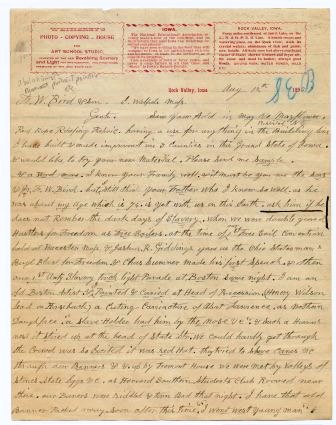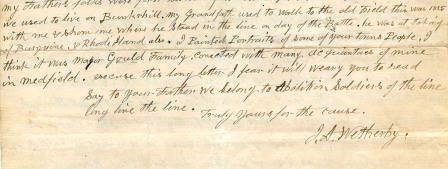By Susan Martin, Collections Services

On 12 August 1895, Isaac A. Wetherby wrote to the firm F. W. Bird & Son of East Walpole, Mass. for a sample of their roofing material. But Wetherby recognized the name Bird, and what started as a perfunctory business letter became two pages of terrific stream-of-consciousness reminiscences about the “dark days of slavery.” Wetherby dropped so many names and references that I thought I’d create a kind of annotated version of the letter here. I’ll retain his eccentric capitalization, punctuation, and misspellings. Starting a few lines in…
& a Word more. I know your Family well. & it must be you are the Sons & Jr. F. W. Bird. but I still think your Father who I knew so well. as he was about my age which is 74. is yet with us on this Earth.
The recipient of this letter was Charles Sumner Bird, the son of abolitionist Francis William Bird. The elder Bird, unbeknownst to Wetherby, had died over a year earlier, and Charles carried on the family’s manufacturing business. Incidentally, sources indicate that Wetherby would have been 75 when he wrote this letter, not 74. And Francis W. Bird was actually ten years older.
ask him if he does not Rember the dark days of Slavery. when we were double geared Hustlers for Freedom as Free Soilers. at the time of our St Free Soil Convention held at Wocester Mass & Joshua. R. Giddings gave us the Ohio Statesmans Bugl Blast for Freedom. & Chas Sumner made his first Speach. & then our 1st Anty Slavery torch light Parade at Boston same night.
The Free Soil Party, founded in 1848, opposed the extension of slavery into new territories annexed by the United States. Charles Sumner of Massachusetts and Joshua Reed Giddings of Ohio were both prominent Free Soilers, and Worcester had been a hot-bed of anti-slavery sentiment since the early 19th century. Wetherby’s reference to a “bugle blast” may be a call-back to an 1839 poem by John Greenleaf Whittier called “The World’s Convention.”
I am an old Boston Artist. & I Painted & Caried at Head of Procession. (Henery Wilson lead on Horseback) a Cuting Carriacture of Abot Lawrence. as Nothern Doughface. “a Slave Holder had him by the nose &c.”
Wetherby was a portrait and ornamental painter and early photographer. For the parade, he caricatured Abbott Lawrence, a cotton manufacturer, U.S. Congressman, and Massachusetts Whig with ties to Southern enslaver. At the front of the procession rode rising political star Henry Wilson. Wilson’s life story is fascinating—he was born into poverty and went on to serve as the 18th vice president of the United States under Ulysses S. Grant.
& such a Humans nest it stired up at the head of State Str. We could hardly get through the Crowd was so Excited it was red Hot. they tried to shove canes &c through our Banners & &. up by Tremont House we were met by Volleys of Stones Stale Eggs &c. as Harvard Southern Students Club Roomed near there. our Baners were riddled & torn Bad that night. I have that old Banner Packed away.
Tremont House was a luxury hotel located on the southwest corner of Tremont and Beacon Streets. The Harvard Southern Students Club may have been a precursor of the university’s Southern Club, established in 1888, and/or the modern-day Southern Students Association.
soon after this time, “I went west young man” came to Iowa as the Indian & wild deer were just leaving. & John Brown & his men I knew well they slept in my Log Barn with their Sharpe’s Rifles. at Iowa City often as they Passed Through with Contrabands Bound for Canada. I lived at Milton hill & Dorchester.
Wetherby had lived primarily in New England until 1854. He moved to Iowa City with his family in the late 1850s, where he opened a photography studio and became the town’s first recognized commercial photographer. He crossed paths with John Brown as the notorious abolitionist smuggled freedom seekers—i.e., “contrabands”—north via the Underground Railroad. Wetherby’s home in Iowa City is a protected historic site, though the barn no longer exists. And his portrait of Brown, probably painted from a photograph, is part of the collections of the State Historical Museum of Iowa.
we were together Hustling for Speakers & kept Potters Steam Press going Printing Handbills written by Eliza Wright. to wake up the then Sleeping North. with Garrison & his Press. & Edmond Jackson & Co who backed him up.
Wetherby almost certainly meant Elizur Wright, abolitionist, secretary of the American Anti-Slavery Society, and prolific writer and editor of anti-slavery literature. His handbills were produced on a printing press manufactured by Charles Potter. William Lloyd Garrison and Edmund Jackson were also prominent abolitionists.
& I had then Just Returned from the South Ky. & Tenn & Predicted the War. I was drove out a Northen man’s life was nothing at that time there. a young Friend of mine was shot dead in the Streets of Louisville. named Bliss from Vermont. he only reported for Louisville Journal a Burlesque Speach of one Pope a Parasite Lawyer & a Turkey Buzzard Polittian. there never was anything done about it. no more than Shooting a Dog.
In 1842, a young teacher and writer named Leonard Bliss was shot by Godfrey Pope on a Louisville, Ky. street after reporting on a political speech by Pope’s cousin. Bliss died ten days later. The MHS holds a small collection of his letters, dating from 1832-1840. Here’s my favorite excerpt, written three days after his 23rd birthday: “I don’t know that I feel conscious of superior powers, but I feel determined to exert the powers I possess. […] I feel the stirrings of a spirit within me, that will not let me rest till I have made men feel that I have existed.” Godfrey Pope was arrested but acquitted of Bliss’ murder.
but years roll on & finds me in the Miss & Missourie river valleys. & in the Center of Civilization. & new England is on the Verge. & & the Grand Nation united & Slavery wiped out. the Giant West. East. & South a unit. & to remember not to be Caught with no Trained Soldiers. as we were just before the War. & that the German motto is right. “the World rests on the Point of the Sword.”
The rest of Wetherby’s letter consists primarily of information about his family, in which he obviously had great pride. His grandfather Judah Wetherbee (the name was spelled differently by other family members) fought at Bunker Hill. In the second letter of the collection, Isaac also boasted about his sister, Emily Greene Wetherbee, an “Educator, Orator & Poet, master of English Literature” with a school in Lawrence, Mass. named after her.
Isaac A. Wetherby died in 1904. I’ll let him take care of the sign-off…
Say to your Father we belong to Abolition Soldiers of the line
long live the line.
Truly yours for the cause.
I. A. Wetherby.


